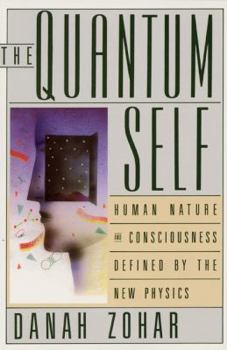The Quantum Self
Select Format
Select Condition 
Book Overview
In The Quantum Self , Danah Zohar argues that the insights of modem physics can illuminate our understanding of everyday life -- our relationships to ourselves, to others, and to the world at large. Guiding us through the strange and fascinating workings of the subatomic realm to create a new model of human consciousness, the author addresses enduring philosophical questions. Does the new physics provide a basis by which our consciousness might continue...
Format:Paperback
Language:English
ISBN:0688107362
ISBN13:9780688107369
Release Date:May 1991
Publisher:William Morrow & Company
Length:272 Pages
Weight:0.84 lbs.
Dimensions:0.7" x 6.1" x 9.2"
Related Subjects
Behavioral Sciences Cognitive Psychology Ethics Ethics & Morality Occult Personal Transformation Philosophy Physics Politics & Social Sciences Psychology Quantum Theory Religion Religion & Spirituality Science Science & Math Science & Scientists Science & Technology Self-Help Spirituality TextbooksCustomer Reviews
5 ratings
Very thought-provoking
Published by Thriftbooks.com User , 22 years ago
This book is highly informative and thought provoking although some of the ideas behind it are confusing. For example, as someone else mentioned, neurones don't have cell walls, because no animal cells have cell walls. And also, the author does not explain the hypothetical Bose-Einstein condensate in the brain very well, even though the idea is one of the central ideas behind the book, nor why it has to be in the brain. The "Frohlich pumped system", if it is indeed responsible for consciousness, it would only require energy, which is existent throughout the human body. Moreover, it is unclear how such a pumped system would come about in the human body, and how it would have been created in the first place through evolution. However, these shortcomings are more than made up by revolutionary ideas (even for now, a decade later), its interpretation of "relationship", and its reasonable scientific backing. No, the real reason I gave it a 4 stars and not 5 is because the middle chapters are kind of repetitive, culminating in a rather hideous chapter "Getting beyond narcissism" which was neither relevant nor philosophically sound. But the last couple of chapters were excellent, and I'd certainly recommend this to any open-minded science buffs (not to laymen, however). Of the many books written about the new physics, this is one of the most precise, and is apparently unafraid of skepticism, which I respect even if it means instigating more erroneous rants about "New Ageist science" is rampant and the "real science" is not from an ill-informed skeptic.
Tolstoy said it first . . .
Published by Thriftbooks.com User , 24 years ago
Based on his awareness that consciousness was more than a chemical reaction in the brain, Tolstoy created his own theory, which the "quantum" theory, so well described in this book by Danah Zohar, is finally catching up to. In other words, as an artist he anticipated quantum theory over 100 years ago. Ridiculing both scientific materialism and dogmatic religions as "superstitions," Lev Tolstoy held that neither institutional science nor institutional religion described the human spirit. ("Belief that everything originates in 'matter' is as silly as a belief in the Trinity." -- L.T.)
Paradigm Shift
Published by Thriftbooks.com User , 25 years ago
Zohar effectively breaks out of Conventional Wisdom's monologue on human consciousness with her "Quantum Self". It is sometimes a difficult task to use the language of today's thought to describe tomorrow's. It is understandable, therefore, when Zohar dips into her personal stash of religious metaphors to describe a world that is decidedly metaphysical. A few religious references may come as an unpleasant surprise at first read, to the self-described universalist, but an open-minded reader will easily see the broader truths being espoused without marriage to a specific western or eastern point of view. It is impossible to stop an idea whose time has come. This book takes us a step closer to a unifying theory of consciousness, matter, and phases of existence.
Thought provoking, interesting read
Published by Thriftbooks.com User , 26 years ago
I'm skeptical of books in this area: I've seen too many New Age gurus citing science that they don't understand to justify opinions they want you to accept. Zohar is different and engaging partly because the writing is clear, and the thought process allows you to qualify conclusions where they need to be qualified (theological students, for example, cringe at the offhand descriptions of religious thought and ideas in this book: nonetheless, the thought is clear enough to be correctible). The science appears well grounded, and to serve as a base for, rather than an excuse for, the insights advanced by the book.
Fascinating and well-written
Published by Thriftbooks.com User , 26 years ago
This book is a must for anyone having an acquaintance with the puzzles posed by quantum theory and a sense that they might have something to do with consciousness, but that the ideas posed so far in answering such questions are inadequate. Zohar's intriguing thesis is that subjective awareness arises directly from quantum processes and that the wave-particle duality (or unity, as Yilmaz calls it) of quantum theory underlies the mind-body duality (or unity) familiar to all of us raised in the Cartesian tradition. My only criticism is that Zohar engages in the all-too-familiar Newton- and Descartes-bashing that has become so popular lately. If one reads Newton's original writings, it is clear that he is not advocating a mechanistic world view but only a method of inquiry in which "formal causes" (as Aristotle would say) are substituted for attempts to find material and final causes. Thus mathematical relationships, rather than purposes and specific qualities of physical objects, became primary in Newton's method. It was in virtue of this insight that the new physics ever become possible at all. Similarly, it is the analytical techniques that Descartes pioneered which have made possible the discoveries that Zohar interprets so compellingly. That criticism aside, this is an excellent book with a revolutionary idea that deserves to be taken seriously.






